By: Mark Glennon*
Will the exodus from big cities that occurred during the pandemic persist or reverse? The final verdict isn’t in, but some new insights are provided by Allconnect. That’s a tech company that assists people moving by finding the right internet provider at their destination.
Their data team analyzed 70 million United States Postal Service residential change-of-address requests from 2019 and 2020 to evaluate the impact of the COVID-19 pandemic on moving trends. The also recently published a report nicely summarizing a number of opinions from various experts, and I connected with them to get some further insights on Chicago.
One thing clear at the outset is that people indeed fled big cities during the pandemic, and Allconnect provided the following chart to illustrate. Chicago, as you can see, was third worst in terms of the simple net of moves in and out:
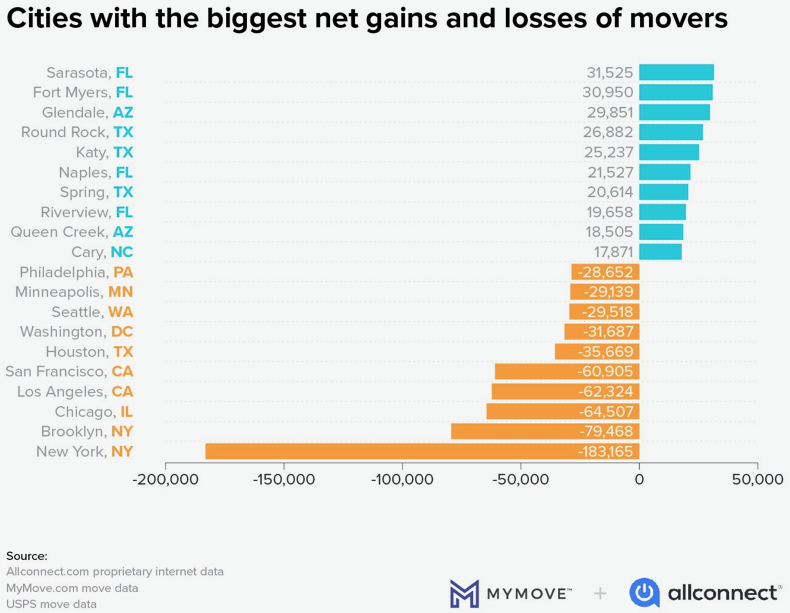 Unfortunately, Chicago has the distinction of being the only city among those to suffer a drop in both people moving in and an increase in people moving out. That is, in other cities, a big increase in people leaving drove the net losses, though they still had small increases in people moving in. But Chicago stood alone, worsening by both counts.
Unfortunately, Chicago has the distinction of being the only city among those to suffer a drop in both people moving in and an increase in people moving out. That is, in other cities, a big increase in people leaving drove the net losses, though they still had small increases in people moving in. But Chicago stood alone, worsening by both counts.
Here are the specifics on both halves of that for the worst three cities:
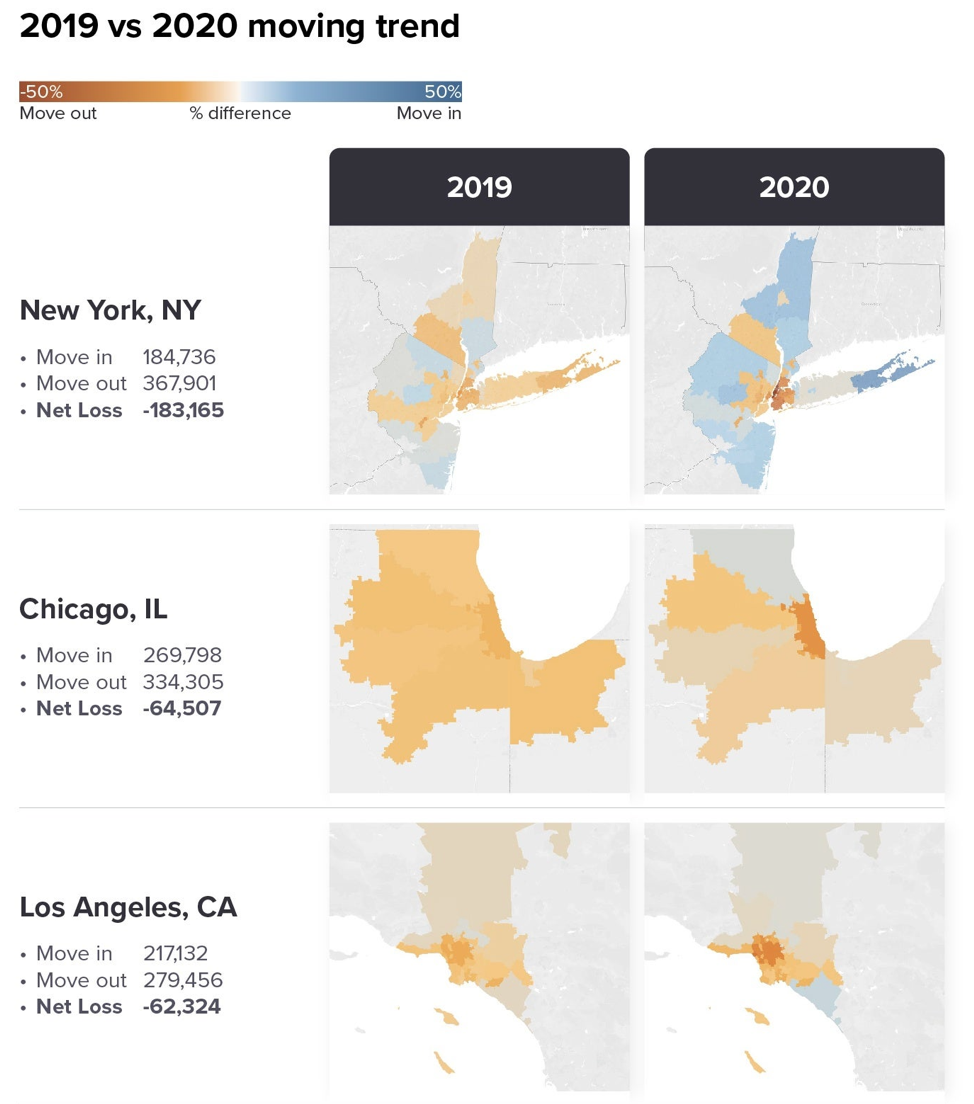
Where did people go?
On that, too, there seems to be a consensus, as reflected in the opinions quoted in Allconnect’s report. They went to suburbs and places within an hour or two of a major city – smaller towns where they are close enough to return to the office if needed.
Suburbs were particularly big winners. From the Allconnect report:
A recent report by Redfin found that the median home price in the U.S. grew to $335,519 in November — 14% higher than the previous year and the biggest annual gain since 2013. 35% of homes sold for more than the asking price, and homes stayed on the market for just 27 days, a record low since the beginning of Redfin’s data in 2012.
Suburbs were the main driver of these eye-popping numbers. “Housing inventory dropped everywhere, but particularly strongly in the suburbs,” said Yichen Su, a researcher for the Federal Reserve Bank of Dallas who has studied the effects of the pandemic on the housing market. “Housing demand for suburban housing increased by much more than that for central city housing in the wake of COVID.”
But again, Chicago appears to be an exception, at least for nearby suburbs. As you can see in the Chicago map above, net moves were negative, except for areas directly north and northeast of the city.
Allconnect’s analysis also confirms the big picture that’s already widely recognized, which is that the South was a big population winner during the pandemic. Here’s their national heat map:
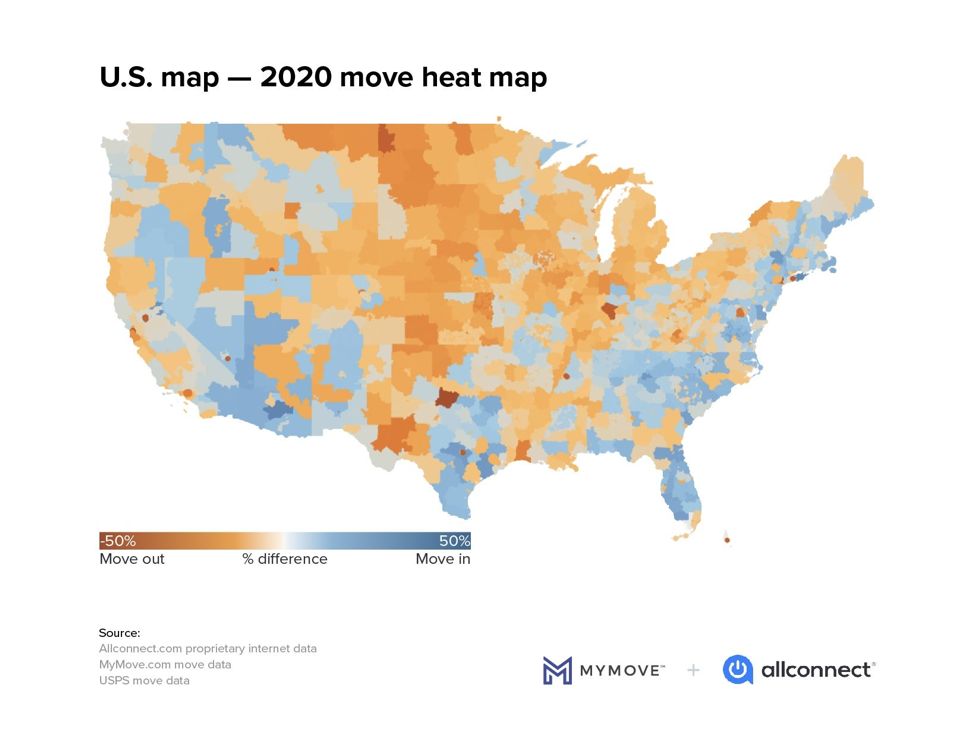 It’s important to keep in mind, with all these numbers, that moves in and out of different parts of the nation are only part of any location’s entire population picture. Population is also driven by international immigration, births and deaths. By that broader measure, the Chicago metro area has perhaps held more steady. Over the last ten years, the city lost only 3,000 people according to earlier census estimates, the losses all occurring in the last six years. (The new, final, ten-year census numbers broken down by city are not yet published.)
It’s important to keep in mind, with all these numbers, that moves in and out of different parts of the nation are only part of any location’s entire population picture. Population is also driven by international immigration, births and deaths. By that broader measure, the Chicago metro area has perhaps held more steady. Over the last ten years, the city lost only 3,000 people according to earlier census estimates, the losses all occurring in the last six years. (The new, final, ten-year census numbers broken down by city are not yet published.)
What comes next? The two biggest factors don’t have clear answers.
First, we don’t know whether the pre-pandemic popularity of larger cities will return. Young people in particular had favored large cities, though that popularity had already faded somewhat even before the pandemic.
Second, we don’t know how strongly the work-from-home trend will continue. It certainly did surge during the pandemic. “A decade ago, the Census Bureau reported that the number of people working from home full-time was around 7%. By May 2020, 35.2% of the workforce worked entirely from home, up from 8.2% in February,” says the Allconnect report.
Business managers, however, seem to have widely varied opinions. Since the pandemic started, I’ve made a habit of asking those that I know. Some remain strong believers in having personnel on site while others are fine without it.
 Allconnect discussed another interesting factor – one pertinent to their work – though they acknowledge it’s less important: access to fast internet. “While most people who moved probably didn’t do it based on internet speeds, the suburbs that picked up the most movers were almost always better suited for remote work than the metro areas they surround…. [A]verage download speeds in the outer suburbs exceeded those in almost every major city.”
Allconnect discussed another interesting factor – one pertinent to their work – though they acknowledge it’s less important: access to fast internet. “While most people who moved probably didn’t do it based on internet speeds, the suburbs that picked up the most movers were almost always better suited for remote work than the metro areas they surround…. [A]verage download speeds in the outer suburbs exceeded those in almost every major city.”
But poor internet speeds are undoubtedly a deal killer for most rural areas hoping to attract the work-from-home crowd. That may be as much as half the country, much of which could not conduct a Zoom call, according to Allconnect. They added, “
Microsoft released internal data that showed that more than 157 million Americans weren’t using the internet at those minimum broadband speeds — 25 Mbps download and 3 Mbps upload — and 43 million didn’t even have access to broadband. According to these numbers, half of the country would have a hard time working remotely. Stanford economist Richard Bloom refers to this WFH economy as an “inequality time bomb.
Anecdotally, I’ve heard the same thing from people fleeing to greener pastures. One example is Jeff Carter, who readers here will recognize as the author of Points & Figures. He and his wife left Chicago and now spend summers in a cabin somewhere in northern Minnesota that somehow has great internet. “We have one gig fiber to our door. I wouldn’t be up here all summer unless I had it,” he told me.
I, for one, don’t know how this will all shake out and there are plenty of other issues important to big cities’ fate, crime probably being most important. What’s clear is that their population trends are among the most important demographic questions of our time. As a fiscal matter, big cities simply cannot afford to lose population.
*Mark Glennon is founder of Wirepoints.

 If you’re frustrated with Illinois’ educational results, you may want to follow the money from teachers unions. In the last four years alone, Illinois lawmakers and political candidates have taken nearly $30 million in contributions from teachers unions and their national affiliates.
If you’re frustrated with Illinois’ educational results, you may want to follow the money from teachers unions. In the last four years alone, Illinois lawmakers and political candidates have taken nearly $30 million in contributions from teachers unions and their national affiliates.
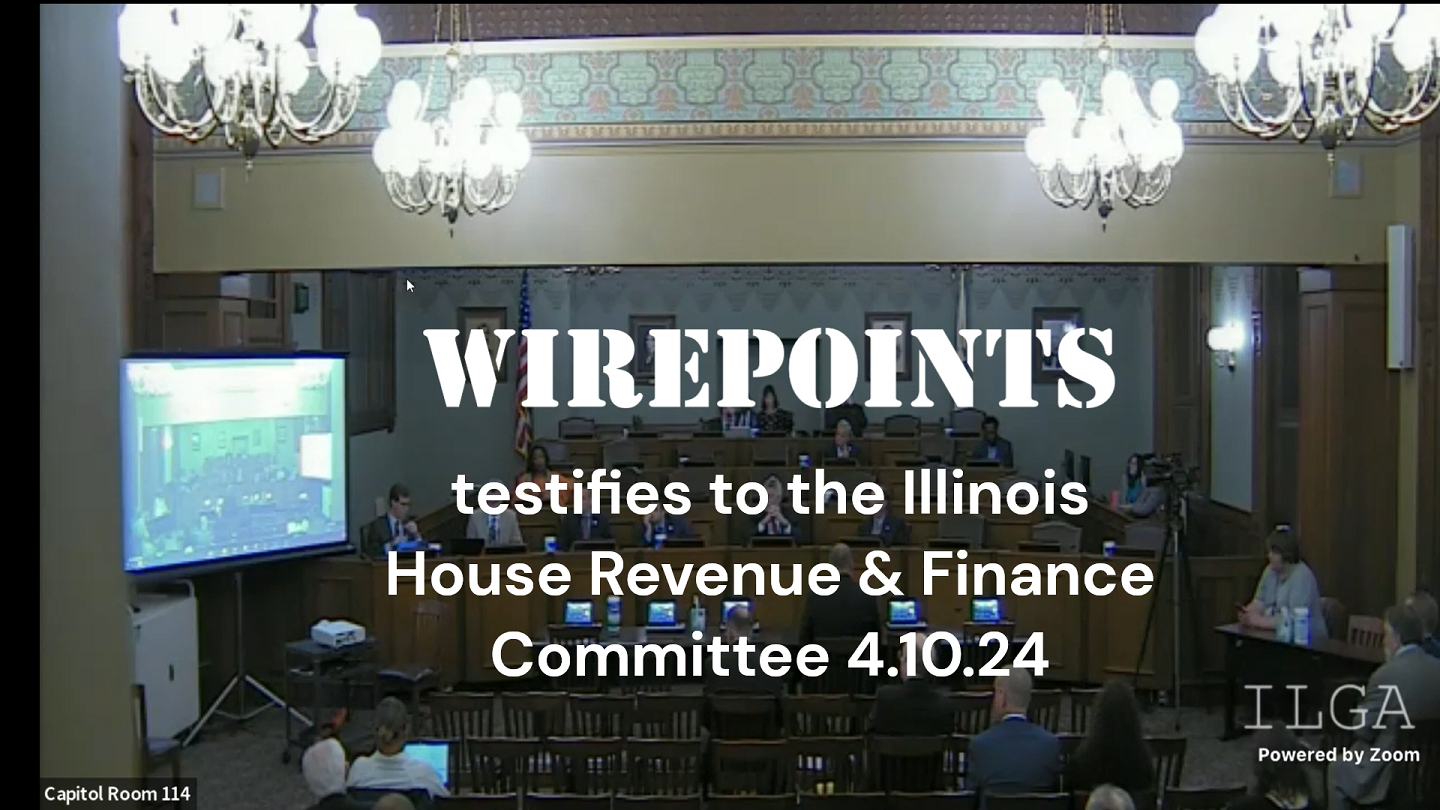 Wirepoints President Ted Dabrowski testified on April 10, 2024 to members of the House Revenue and Finance Committee at the invitation of Rep. Joe Sosnowski. Ted told lawmakers that the state’s property tax burden has become dire for countless Illinoisans.
Wirepoints President Ted Dabrowski testified on April 10, 2024 to members of the House Revenue and Finance Committee at the invitation of Rep. Joe Sosnowski. Ted told lawmakers that the state’s property tax burden has become dire for countless Illinoisans.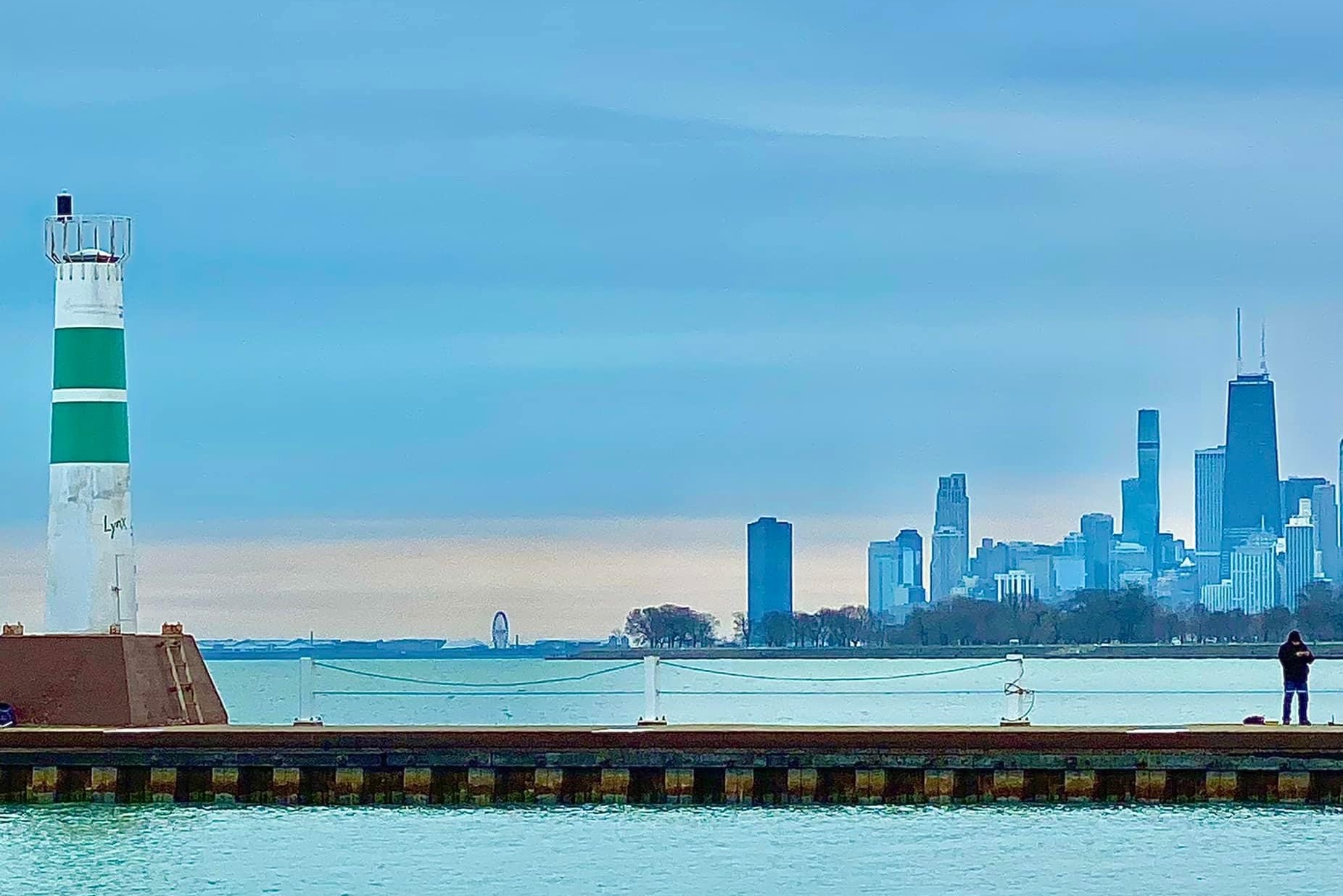 Ted joined WLS 890’s PM Chicago Show to discuss Chicago’s worsening pension crisis, why the city’s crisis makes it such an outlier nationally, its negative impact on residents, government workers and retirees alike, and what Mayor Brandon Johnson should do about it.
Ted joined WLS 890’s PM Chicago Show to discuss Chicago’s worsening pension crisis, why the city’s crisis makes it such an outlier nationally, its negative impact on residents, government workers and retirees alike, and what Mayor Brandon Johnson should do about it. When has any company persisted with a project in the face of stronger local, statewide and national opposition? When have taxpayers subsidized a more harebrained project?
When has any company persisted with a project in the face of stronger local, statewide and national opposition? When have taxpayers subsidized a more harebrained project?
Newly developed availability of this type granular data can have a big impact on sustainability of corrupt sinkhole -of- value States and cities like Illinois and Chicago. Chicago relies on a steady stream of ‘bigger fools’ to subsidize its corrupt political infrastructure. Bigger fools are young people who don’t yet understand the erosion of their own earnings and home values which will occur over the subsequent 30 working years as a function of aberrant high property taxes and other taxes taken without any value added in return. Bigger fools are immigrants who do not yet know the myriad complex, ambiguous… Read more »
Commuting workers are only half the story. The other half is business travel is down and that has a larger impact on restaurants and some impact on bars/entertainment venues. The commuting worker isn’t staying after work for dinner. They may hand out for 30 minutes after work for a drink but they aren’t staying around for two or three. The bigger issue is companies like Walgreens and McDonald’s that were moving back into the city to attract younger workers are going to find that supply shrinking. And forget the dumb politics for a moment. Even in safe, well-run cities the… Read more »
As a rural Illinoisan I can testify to the broadband woes. It’s been one promise after another. But the real deal killer is the data limits. Currently I’m using Consumer Cellular and a Hotspot WiFi router for my internet access. Best so far but speeds are 25 mbs (not MBs) on a good day. And they will automatically adjust your plan to accommodate more data and NOT reduce speeds. What good is unlimited data if your speed gets slowed to 600k? The last week has been pretty bad for cell connections though. Having a hard time posting this right now.… Read more »
Woodstock Il is a valuable case study in local small-government practices of strip-mining local resources (tax dollars) to reward themselves a la Bell California, at the survival-level expense of the taxed community. Property tax rates in Woodstock have ranged between 3%-5% for well over a decade, while Illinois and America enjoyed tax rates below 1% in America and below 2% in Chicago. Woodstock CUSD 200 taxable EAV (property value measure) is lower than before the crash. There has been zero contributory real estate development. (What moron would risk development in a 4% property tax rate region, when all over America… Read more »
The attitude among most public sector union employee’s is: I got mine!
Interesting analysis. Many people at my work are going to hold out to the bitter end – they aren’t going back to the office till ordered to. Just ran into another friend who is in the process of permanently relocating to Door Co, WI to work remotely for their six figure Central Illinois job – selling home and escaping taxinois while keeping job. I think people everywhere are enjoying the new flexibility of remote work.
The pandemic has emboldened many people. Working people see others who are resting on unemployment, making fairly good money, while doing occasional side jobs for cash. The net of these “unemployed” people isn’t that far from a working professional, because these people on the dole don’t pay payroll taxes. So the working people are identifying the labor shortage at all levels, and they’re making their stand. Let’s face it, who likes sitting in traffic and traveling to work every day in the cold or slush? It’s a big part of the “grind,” as I call corporate work. Plus, you get… Read more »
My single twentysomething daughter had to go back into the Loop this week and commented how it sucked and was exhausting and she’s by Lincoln Park! Flexibility is a wanted perk, and people can’t go back now that they have had it. Her older coworkers from suburbia with families demanded to know why they had to come in- they were pissed!
Get in car > morning rush to train station > find a parking spot > walk to platform > wait for train > train > walk to office > work > walk to train station > wait for train > train > race to parked car > deal with maddening traffic leaving train station > rush hour traffic home > park car Took awhile for many employers to realize there are so many productive things can be done instead. I think offices will downsize, employees will still come in but with less frequency and hotel at workstations instead of having… Read more »
I agree that there will be a compromise. The oldest executives don’t like the new way, because they already have flexibility.
But they will have to give something, and 3 days a week is not a bad alternative. My guess is that people will really like that option.
Execs also need to consider that many people have had their home lives disrupted by the constant emails, texts and crossing over of the work/home boundary — entirely for the benefit of the company.
It’s time to give some of that boundary back.
The political class is figuring out a way to make sure they get the tax money out of those staying at home as well. Once Illinois passes some new tax laws that will tax people based on their work location in the state and not on residential location the exodus will truly begin. I can only hope the ruling class in Illinois attacks retirement income first. Go after those that have created this mess first.
Tax retirement income and watch it’s senior citizens flee. There are other states that don’t tax it. The people that created this mess are not retirees. The Chicago liberal voters are primarily responsible.
And while that happens end the extra homestead tax exception and assessment freezes granted to Seniors who used to vote against real estate tax hikes but now do because “it’s for the children” and costs them no extra money.
The political class is running out of treasure to raid. Everywhere they look, someone’s ox is getting gored, and it’s getting a bit uncomfortable for them. But then they (Democrats) look behind them and they see public unions menacing them as well.
Not many places to turn, so they’ll take the path of least resistance, wherever they may find it. This time it was a federal bailout.
Tax union workers
I sense that there is a lot more conversation about this behind the scenes between city officials than they are letting on. For example, Lightfoot was fairly persistent in trying to get restaurants open sooner than later during the pandemic, while Pritzker tended to object, “in the name of safety.” It became a bit of a public disagreement. I think she was recognizing that without amenities, proximity to a job is the only other real reason to live in the city. And without a job–or working from home–that reason is gone indefinitely. This point may seem obvious, but it has… Read more »
Damn, in one year, progressive strongholds Minneapolis and SF each lost about 7% of their population. Never underestimate humanity’s desire to escape the crazy.
https://truenorthbroadband.com/about-us/ here is our internet provider. 1 gig fiber to the door if you want it. The area we are in had people move here from Minneapolis looking to rid themselves of the “peaceful protests”.
But Jeff, tell us about the mosquitoes there in the north woods.
It’s no worse than living within a few miles of any forest preserve.
The weather is what sucks. gets colder sooner and stays colder longer. The trick is to embrace the cold outdoor lifestyle – deer hunting at thanksgiving, cross country skiing, ice skating, curling, ice fishing, snow mobiling, fish boils, etc.